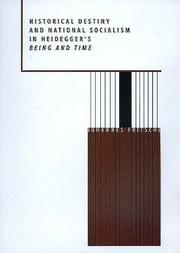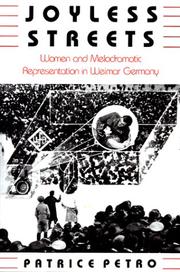| Listing 1 - 3 of 3 |
Sort by
|
Book
Year: 2019 Publisher: FedOA - Federico II University Press
Abstract | Keywords | Export | Availability | Bookmark
 Loading...
Loading...Choose an application
- Reference Manager
- EndNote
- RefWorks (Direct export to RefWorks)
Divided into three sections: the existential analytics between neokantism, phenomenology and hermeneutics; ethics, praxis, politics starting from Being and Time; confrontations, deepening, perspectives, this collective volume, inspired by "a hermeneutics of Sachlichkeit", tries to offer a balance on the actuality and unactuality of existential analytics ninety years after publication of Being and Time. Authors from different contexts present the existential analytics in the historical and theoretical context of its first formulation, question the complex problem of a possible praxis or a possible ethics within Heideggerian ontology and measure the impact of existential analytics on contemporary thinkers. It emerges how, despite all the problems and open questions, "the debt of contemporary thought to Heidegger is great and how important it is to preserve the legacy of his thought and the tradition in which it is placed, beyond any false alternative between naive apologetics and radical criticism". Articolandosi in tre sezioni: l’analitica esistenziale fra neokantismo, fenomenologia ed ermeneutica; etica, prassi, politica a partire da Essere e Tempo; confronti, approfondimenti, prospettive, questo volume collettaneo prova ad offrire un bilancio sull’attualità e inattualità dell’analitica esistenziale a Novata anni dalla pubblicazione di Essere e Tempo ispirandosi ad “un’ermeneutica della Sachlichkeit”. Autori provenienti da diversi contesti presentano l’analitica esistenziale nel contesto storico e teorico della sua prima formulazione, si interrogano sul complesso problema di una possibile prassi o di una possibile etica all’interno dell’ontologia heideggeriana e misurano l’impatto dell’analitica esistenziale su pensatori contemporanei. Ne emerge come, nonostante tutti i problemi e le domande aperte, sia grande «il debito del pensiero contemporaneo verso Heidegger e come sia importante conservare l’eredità del suo pensiero e della tradizione in cui si colloca, al di là di ogni falsa alternativa fra ingenua apologetica e critica radicale».
xxxx --- phenomenology --- Heidegger --- hermeneutics --- Neokantism --- ethics --- Being and Time --- phenomenology --- Heidegger --- hermeneutics --- Neokantism --- ethics --- Being and Time

ISBN: 0520919599 0585081522 9780520919594 9780585081526 9780520210028 0520210026 0520210026 Year: 1999 Publisher: Berkeley University of California press
Abstract | Keywords | Export | Availability | Bookmark
 Loading...
Loading...Choose an application
- Reference Manager
- EndNote
- RefWorks (Direct export to RefWorks)
There has been much debate over the relationship of Heidegger's philosophy--in particular his book Being and Time--to his practical involvement with National Socialism. Yet the question has never been addressed through a comparison of Being and Time with other texts on history and politics written at the time. Johannes Fritsche does this, providing a detailed interpretation of the relevant passages in Being and Time--especially sections 72-77 on fate, community, and society. He analyzes for comparison two other authors who explicitly regarded themselves as rightists--Adolf Hitler (Mein Kampf) and Max Scheler (Formalism in Ethics and other writings)--and two authors on the left--Georg Lukács (History and Class Consciousness) and Paul Tillich (The Socialist Decision). Fritsche concludes that Being and Time is a brilliant summary of right-wing politics in general, which proposes the destruction of liberal society in order to regenerate an idealized community. In addition, Heidegger rejects positions on the right, such as Scheler's, that enabled their authors to distance themselves from the most extreme political rightists, and thus he paves the way for National Socialism. Being and Time, Fritsche demonstrates, must be seen as a clear case for the National Socialists and their project of revitalization of the Volksgemeinschaft, the community of the people.
National socialism and philosophy. --- National socialism and philosophy --- Philosophy & Religion --- Philosophy --- Heidegger, Martin, --- Philosophy and national socialism --- adolf hitler. --- being and time. --- community. --- existentialism. --- fate. --- formalism in ethics. --- georg lukacs. --- german philosophy. --- heidegger. --- history and class consciousness. --- history and politics. --- idealized community. --- left wing politics. --- leftist politics. --- liberal society. --- martin heidegger. --- max scheler. --- meaning of being. --- mein kampf. --- metaphysics. --- national socialism. --- paul tillich. --- phenomenology. --- philosophy. --- political philosophy. --- politics. --- right wing politics. --- rightist politics. --- socialism. --- society. --- the socialist decision. --- volksgemeinschaft. --- National-socialisme --- Fascisme --- National-socialisme et philosophie --- Allemagne --- 1933-1945

ISBN: 0691055521 Year: 1989 Publisher: Princeton : Princeton University Press,
Abstract | Keywords | Export | Availability | Bookmark
 Loading...
Loading...Choose an application
- Reference Manager
- EndNote
- RefWorks (Direct export to RefWorks)
Patrice Petro challenges the conventional assessment of German film history, which sees classical films as responding solely to male anxieties and fears. Exploring the address made to women in melodramatic films and in popular illustrated magazines, she shows how Weimar Germany had a commercially viable female audience, fascinated with looking at images that called traditional representations of gender into question. Interdisciplinary in her approach, Petro interweaves archival research with recent theoretical debates to offer not merely another view of the Weimar cinema but also another way of looking at Weimar film culture. Women's modernity, she suggests, was not the same as men's modernism, and the image of the city street in film and photojournalism reveals how women responded differently from men to the political, economic, and psychic upheaval of their times.
Frau. --- Motiv (Literatur) --- Motiv (Kunst) --- Geschichte. --- Film. --- Frau --- Film --- Liebesfilm --- Zuschauer --- Weimarer Republik --- Stummfilm --- Deutschland. --- Deutschland --- Anna Boleyn. --- Baudelaire, Charles. --- Being and Time. --- Berlin. --- Buci-Glucksmann, Christine. --- Communist Party. --- Derrida, Jacques. --- Elsaesser, Thomas. --- Evans, Richard J. --- Freud, Sigmund. --- Geschlecht in Fesseln. --- Grossmann, Atina. --- Hansen, Miriam. --- Heidegger, Martin. --- Hollywood cinema. --- Irigaray, Luce. --- Jardine, Alice. --- Johnston, Claire. --- Kammerspielfilm. --- Kerbs, Diethart. --- Koonz, Claudia. --- Lamprecht, Gerhard. --- Lang, Fritz. --- Letzte Mann, Der. --- Luxemberg, Rosa. --- Mellencamp, Patricia. --- Metropolis. --- Munson, Anthony. --- Nazi cinema. --- Nolde, Emil. --- Oedipal narrative. --- Prometheus. --- Quataert, Jean. --- Querschnitt, Der. --- Ruttmann, Walter. --- Schönlank, Bruno. --- androgyny: female. --- anti-Semitism. --- censorship, film. --- consumerism. --- crisis: historical. --- documentary realism. --- film style. --- homophobia. --- hysteria. --- imperial Germany. --- masquerade. --- mass culture. --- modernism. --- petite-bourgeoisie. --- photoessay. --- press archives. --- rationalization. --- Alemania --- Ashkenaz --- BRD --- Bu̇gd Naĭramdakh German Uls --- Bundesrepublik Deutschland --- Deguo --- 德国 --- Deutsches Reich --- Doitsu --- Doitsu Renpō Kyōwakoku --- Federal Republic of Germany --- Federalʹna Respublika Nimechchyny --- FRN --- Gėrman --- German Uls --- Герман Улс --- Germania --- Germanii︠a︡ --- Germanyah --- Gjermani --- Grossdeutsches Reich --- Jirmānīya --- KhBNGU --- Kholboony Bu̇gd Naĭramdakh German Uls --- Nimechchyna --- Repoblika Federalin'i Alemana --- República de Alemania --- República Federal de Alemania --- Republika Federal Alemmana --- Vācijā --- Veĭmarskai︠a︡ Respublika --- Weimar Republic --- ХБНГУ --- Германия --- جرمانيا --- ドイツ --- ドイツ連邦共和国 --- ドイツ レンポウ キョウワコク --- Germany (East) --- Germany (Territory under Allied occupation, 1945-1955) --- Germany (Territory under Allied occupation, 1945-1955 : British Zone) --- Germany (Territory under Allied occupation, 1945-1955 : French Zone) --- Germany (Territory under Allied occupation, 1945-1955 : Russian Zone) --- Germany (Territory under Allied occupation, 1945-1955 : U.S. Zone) --- Germany (West) --- Holy Roman Empire --- Analyse cinematographique --- Feminisme et le cinema --- Femmes et le cinema --- Films musicaux --- Rapports sociaux entre sexes dans les films --- Stummfilme --- 1918-1933 --- Betrachter --- Publikum --- Zuschauerin --- Erwachsene Frau --- Weib --- Weibliche Erwachsene --- Frauen --- Erwachsener --- Weiblichkeit --- Deutsche Länder --- Germany --- Heiliges Römisches Reich --- Rheinbund --- Deutscher Bund --- Norddeutscher Bund --- Republic of Germany --- Allemagne --- Ǧumhūrīyat Almāniyā al-Ittiḥādīya --- Niemcy --- République Fédérale d'Allemagne --- Repubblica Federale di Germania --- Germanija --- Federativnaja Respublika Germanija --- FRG --- Deyizhi-Lianbang-Gongheguo --- Deutsche --- Deutsches Sprachgebiet --- 03.10.1990 --- -Anna Boleyn.
| Listing 1 - 3 of 3 |
Sort by
|

 Search
Search Feedback
Feedback About UniCat
About UniCat  Help
Help News
News